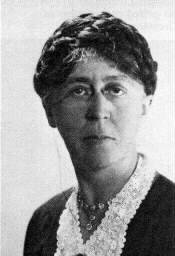Mary Parker Follett: an unsung heroine
16 Apr 2015
 Dilys Robinson
Dilys Robinson
Mary who?
Mary Parker Follett (1868 to 1933) was an American political scientist and management thinker, who believed in the importance of the principles of democracy and co-operation at work. She reasoned that a business is a microcosm of human society, where people at all levels should be motivated to work and participate; organisations are based fundamentally on co-operation and co-ordination.
Rather than being the passive recipients of ‘top down’ communications and a ‘command and control’ management style, Parker Follett felt that people should gather their own information, define their own roles and shape their own lives at work. She stipulated that organisations are based fundamentally on co-operation and co-ordination; this is the single unifying principle holding them together.
Why does Mary Parker Follett deserve to be celebrated?
Simply because she was way ahead of her time! She advocated the principles of organisational citizenship, employee empowerment, self-managed teams and the importance of two-way employee engagement long before these terms gained a foothold. She was also a woman (in a man’s world) who, until the industrial prevailing mood shifted in the years before, during and after WW2 and became more ‘masculine’, was respected and admired for her ideas and advice. She was invited to address the London School of Economics and was asked by President Theodore Roosevelt to advise on managing not-for-profit, non-governmental and voluntary organisations.
Her key influential ideas
Samples of her thinking, which serve to show how relevant her ideas are to today’s climate, include:
The ramifications of modern industry are too wide-spread, its organisation too complex, its problems too intricate for industry to be managed by commands from the top alone.
You must have an organisation which will permit interweaving all along the line…
The leader knows that any lasting agreement among members of the group can come only by their sharing each other’s experience.
The difference between competition and joint effort is the difference between a short and a long view.
What we can learn from Mary Parker Follett
Mary Parker Follett teaches us that:
- People are important and deserve to be treated as adults in organisations – leaders cannot and should not assume responsibility for everything. This is very relevant to today’s world, in which we are recovering from recession and starting to reshape our organisations for the future. We have a choice to make, and surely we should opt for increasing the employee voice and the influence of employees in decision-making?
- Co-operation at work is fundamentally important. Let’s increase opportunities to work together, thereby lessening the damaging impact of the silo mentality – and let’s encourage employees to take responsibility for self- and team-organisation.
- Women had a serious voice as management gurus in the past, but their influence was eclipsed by more ‘masculine’ styles of thinking. Is it time to open our minds to management styles that emphasise social collaboration?
- Many of our ‘new’ ideas are not new at all! We can learn from the giants of the past, instead of being so ready to label historic voices as ‘dinosaurs’.
Further reading
Mary Parker Follett — Prophet of Management: a Celebration of Writings from the 1920s, edited by Pauline Graham. A Harvard Business School Press Classic, published by Harvard Business School Press, Boston Massachusetts 1995, ISBN: 0 87584 563 0
MARY P. FOLLETT:Creating Democracy, Transforming Management, Joan C Tonn, Yale University Press 2003 ISBN: 0-300-09621-6


